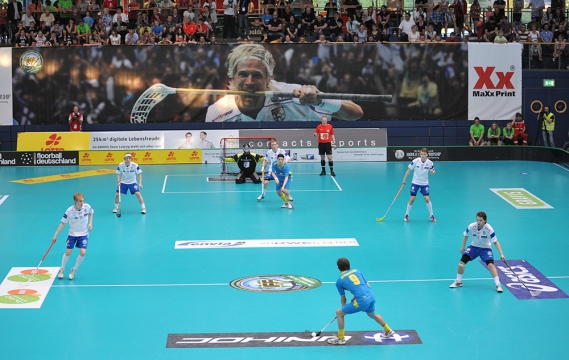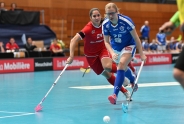12.
2015
About parked buses and rhinos
When I studied to become a journalist, I did my internship at the sports department of Swedish Television (SVT), and I made a deal with Anders Huusko, former national team player for Sweden in ice hockey, and at the time working as an expert commentator for SVT. He would guide me in the archipelago of Stockholm, trying to catch big pike, and I would help him coach his daughters floorball team now and then. As a bonus, I asked him to teach me more about how to defend in ice hockey, because to me, it visually looks pretty much the same, regardless of what team I watch. ”Well, that one is easy”, said Anders. ”There really is not much of a difference”.
 In floorball, every game can look totally different depending on the chosen tactics by the coach and the team.
In floorball, every game can look totally different depending on the chosen tactics by the coach and the team.
I know that I am not a football or ice hockey nerd, but the differences of subtle things that teams do different, usually does not occur to me when I watch these sports. Sure, I can tell the difference between Mourinho parking the bus in front of his net, and Klopf trying to run the opponent’s goal over with ten rhinos on a Gegenpress-mission, but I am not nerd enough to get the small decisive details, and therefor most football and ice hockey games tend to look the same to the average spectator.
This is not the case in floorball, where a match can look visually entirely different, even to someone who only has the slightest interest in the sport. In comparison to other big team ball sports, us coaches have such a diversity in our hands. This is such an advantage for our sport, that I think we should benefit from it even more. Ever thought of why we see so many furious comebacks in floorball? A game can easily be five short different games in one, if the coaches play their cards aggressively.
Unlike several other team ball sports…
- Floorball can be played with success with a zone marking system, as well as a man-man system.
You will rarely see handball played with success in a man-man system, and it never occurs in ice hockey or football. In several basketball leagues, zone defense is prohibited.
- Floorball has such dynamics. It could be played with a wicked high pressure all over the court, as well as staying back way behind the middle line with the sole purpose of blocking shots and counter attacking.
Pressuring hard over the entire court in handball is bound to fail, since players are too good while holding the ball in their hand. In ice hockey, you will never see a team backing down way low in their own zone, they would never benefit from it. If a team plays defensively, they will never give up an easy zone entry, and the blue line causes the game to be extremely boring, and therefor this sport lacks this kind of defensive dynamics.
- The face-off and effective clock gives teams the chance to make astonishing comebacks. And pulling the goalie actually has a good chance of working in your favor.
In handball, the clock seldom stops. And teams always get possession after having conceded a goal. And again, since you have the ball in your hand, it is pretty hard to force a turnover. In football, someone is going to be severely injured for nine of the last twelve minutes. In floorball, the SPV-comeback from this season, going from 0-6 to 6-6 in less than five minutes says all about the possible gamechanger of pulling your goalie. The momentum changer of a goal in floorball is unique, and the face-off is making sure no one automatically gains possession after a conceded goal.
- Another reason for comebacks: The Mario Kart-effect…well, no. That is actually approximately as big of a factor in floorball as in other sports. And that is a story for another issue.
These things are advantages within the floorball diversity, that I think we should play out more often, to create even more intriguing coaches’ battles and entertaining games, switching style from one period to the other.
And hey, I am not saying that we are perfect. I am just saying that this sport has the potential to be the most entertaining sport in this world. I get bored from time to time, my teams play boring from time to time. But there is so much potential, and all of us coaches have control of the strings to pull.
That is why I am happy that I am seeing several NLA-teams stretching the borders of their own systems, trying out different ways to play. It creates exciting games and develops our players further.
--
The Author:
David Jansson (1980) has been the Coach of the Swiss National team since June 2015. Already as a 17-year old, he debuted in the SSL (Swedish highest division) and between years 1995-2005 he had played for 3 different clubs - Jönköpings, Älvstranden and Pixbo. His coaching career includes two years as head coach of the swiss club Floorball Köniz (2009-2011) as well as four years by Pixbo Wallenstam. He had also worked as the sports teacher at the floorball gymnasium in Gothenburg. He lives in Kloten.










Boesch Klaus
10. 09. 2025
maverick
10. 09. 2025
QPbmCRVM 45.153.34.240
10. 09. 2025
QPbmCRVM 45.153.34.240
10. 09. 2025
QPbmCRVM 45.153.34.240
10. 09. 2025
QPbmCRVM 45.153.34.240
10. 09. 2025
QPbmCRVM 45.153.34.240
10. 09. 2025
QPbmCRVM 45.153.34.240
10. 09. 2025
QPbmCRVM 45.153.34.240
10. 09. 2025
QPbmCRVM 45.153.34.240
10. 09. 2025
QPbmCRVM 45.153.34.240
10. 09. 2025
QPbmCRVM 45.153.34.240
10. 09. 2025
QPbmCRVM 45.153.34.240
10. 09. 2025
QPbmCRVM 45.153.34.240
10. 09. 2025